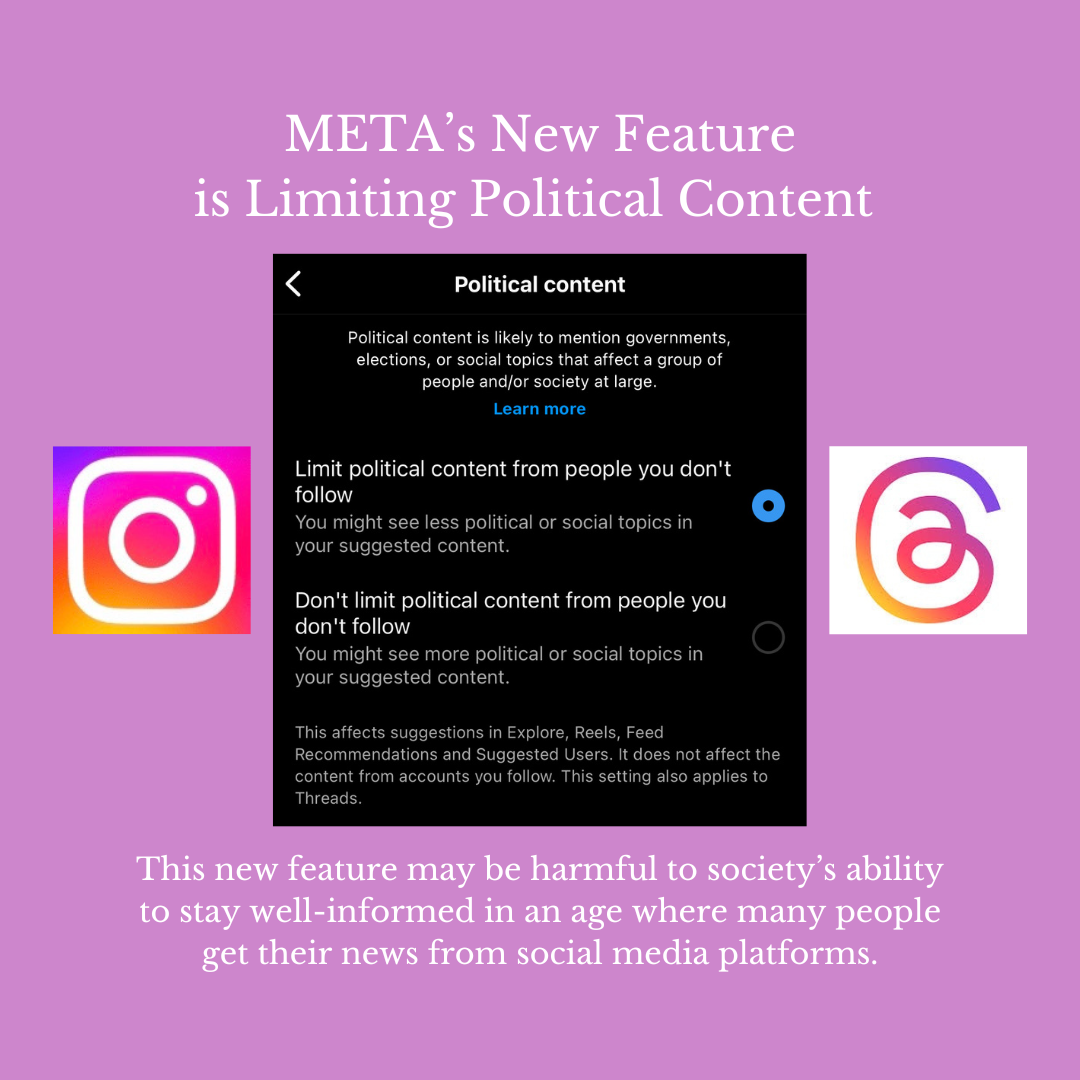With a sharp increase in political content and posts revolving around social issues, Meta introduced a new feature to its social media platforms Instagram and Threads in March that filters political content for its users.
The new feature automatically limits the political content available for users to see on their feeds. Users have the option to turn this feature off by going to their settings, “content preferences,” “political content,” and then choosing “Don’t limit political content from people you don’t follow.”
Meta says that this feature will not affect how users see content from people that they already follow, rather these limitations will apply to public accounts in places where content is recommended to users, such as the explore page, reels, and in-feed recommendations.
A report from the Pew Research Center says that 84% of people surveyed believe that access to the internet and social media has made the public easy to manipulate with false information and rumors, and 65% think that it makes people more divided in their political opinions. While this new Meta feature may be attempting to remedy these drawbacks, it also comes with negative consequences.
Michigan State University American politics professor Meghan Wilson thinks that this new feature should not exist. She believes that attempts to limit political discourse are harmful to society’s ability to remain well-informed.
“I think we need to learn how to have hard conversations,” said Wilson. “I do think that there needs to be some content moderation around making sure that things are true and honest, but beyond that, I think we should allow for political discourse that is respectful.”
Younger generations often get their news from social media, whether that be from the accounts of news organizations or their mutual friends. This new feature has the potential to severely decrease the amount of news and content about social issues circulating amongst the public, Wilson added.
“We’re gonna get more and more generations of people who are disinvested and I think it’s gonna have a negative impact on the future of our country, the future of our world, actually,” said Wilson. “Social movements happen a lot right now, in this era, on social media… So we won’t have the kind of tools anymore to do that work.”
MSU criminal justice sophomore Betsy Marioni agrees that this new feature will decrease the general public’s awareness, especially about the state of the world in general.
“Obviously there’s a lot of things going on right now,” said Marioni. “I think (the feature) prevents a lot of people from learning about current events and being up to date with what’s going on.”
The report from the Pew Research Center says that 73% of people believe that access to the internet and social media has made the public more informed about current events in other countries and their own.
Content on social media is also more accessible for the general public, as a lot of news organizations put their articles behind paywalls and require subscriptions. This is particularly concerning because of the current state of international affairs and the United States entering into an election year.
“Now you’re saying that we can’t have political discourse on this platform… What does that mean for the future?” said Wilson. “It means that they won’t have political discourse at all… That’s what happens when you put the public good, which is news and political discourse, into the hands of the private market, is they get to make these decisions that detrimentally hurt entire generations.”
Marioni expressed concerns about Generation Z, those born from 1997 to 2012, because many of them are just starting to vote or will be able to in the near future. This new feature could create a spike in uneducated voters, or a decrease in voter turnout, both of which would harm the foundation of our democracy.
“Social media is like one of the largest, if not the largest, platform for outreach,” said Marioni. “I think that (the feature) prevents a lot of outreach especially to the younger generations who are just starting to vote.”
While this new Meta feature has ample potential for harm, Wilson also believes in the public’s ability to overcome these barriers.
“I think that we’re resilient and we’ll find other ways to communicate and other ways to get political content,” said Wilson. “I hope that we keep fighting for free press, that we keep fighting for public media.”
